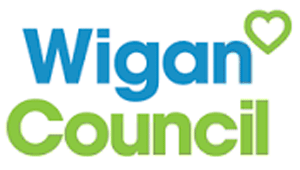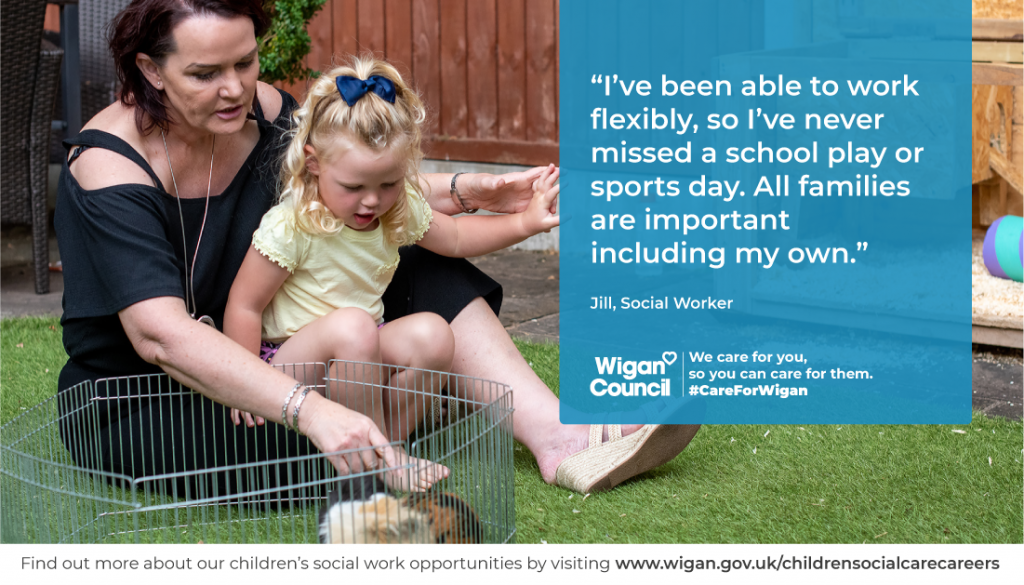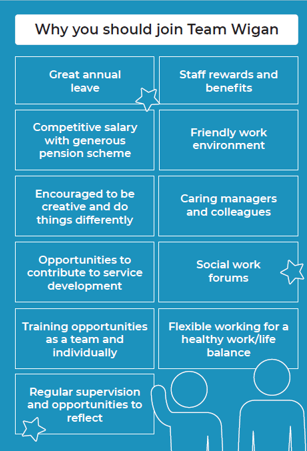
Want to learn more about working in Wigan Council’s children’s services teams before applying for a role? Find out more about the people, the place and areas of practice that may interest you here.
Events
 Are you ready to invest in your social work career? Join our virtual recruitment event for children’s services social work at Wigan Council.
Are you ready to invest in your social work career? Join our virtual recruitment event for children’s services social work at Wigan Council.
Wigan Council invites you to our next virtual social work recruitment event for children’s services.
We have lots of exciting opportunities available in our teams and are looking for experienced and senior social workers to join us and make a real difference to families in our borough.
Colette Dutton, director of children's services
 I joined Wigan Council in July 2020, and have been consistently impressed with the culture of kindness across the council. We have recognised that our social workers want to spend time with children and families and work with them meaningfully, and so we are investing in our workforce to create this additional capacity. We want all of the children in our borough to achieve the best possible outcomes, and we recognise the importance of providing our staff with an environment where good social work practice can flourish. We want you to develop your career in Wigan, and our commitment is that we will support you to do this.
I joined Wigan Council in July 2020, and have been consistently impressed with the culture of kindness across the council. We have recognised that our social workers want to spend time with children and families and work with them meaningfully, and so we are investing in our workforce to create this additional capacity. We want all of the children in our borough to achieve the best possible outcomes, and we recognise the importance of providing our staff with an environment where good social work practice can flourish. We want you to develop your career in Wigan, and our commitment is that we will support you to do this.
Sandie Hayes, practice director
 I joined Team Wigan in January 2021. Here in Wigan, our social workers benefit from kind and supportive colleagues, and inspiring, caring and engaging managers – the importance of good working relationships runs throughout the whole Council. Alongside our partners, using our asset-based model of practice, we work with families to support them to give their children the best possible life experiences. We know that our workforce are our greatest asset, and we are committed to providing a wealth of opportunities to support their professional development and career progression.
I joined Team Wigan in January 2021. Here in Wigan, our social workers benefit from kind and supportive colleagues, and inspiring, caring and engaging managers – the importance of good working relationships runs throughout the whole Council. Alongside our partners, using our asset-based model of practice, we work with families to support them to give their children the best possible life experiences. We know that our workforce are our greatest asset, and we are committed to providing a wealth of opportunities to support their professional development and career progression.
Rebecca Sutton, service lead - workforce & QA/ principal social worker
 I’ve been with the Council since October 2019. The culture here in Wigan promotes creativity in practice. While everyone shares the same vision, you have permission to think and do things differently. Our staff are listened to, and their views are valued. There is a real commitment to getting it right not just for our children and families, but for our dedicated and passionate workforce.
I’ve been with the Council since October 2019. The culture here in Wigan promotes creativity in practice. While everyone shares the same vision, you have permission to think and do things differently. Our staff are listened to, and their views are valued. There is a real commitment to getting it right not just for our children and families, but for our dedicated and passionate workforce.
Meet the social workers in CIN/CP
Shelby, newly qualified social worker in CIN/CP
“I feel managers care about the staff and are passionate about the families they support.”
Anna, social worker in CIN/CP
“Working in locality is rewarding and it is nice to look at how far families have come and how we have been able to support them on that journey.”
Nuala, locality social worker in CIN/CP
“We work in a role that is highly stressed but I feel like Wigan is good at helping us to build our resilience.”
Our News

Wigan Council has been named an excellent employer by the Workplace Wellbeing Charter.
The Charter is a national accreditation that recognises businesses that achieve the highest standards in workforce wellbeing.
Achieving the highest level of excellence in four of the eight Workplace Wellbeing Charter standards and scoring highly in the other four areas Wigan’s commitment to our Staff Deal and caring for the health and wellbeing of Team Wigan is real!
Click here to read how Wigan supports the wellbeing of our social workers.
Meet Our Teams
- TEAMS AND DUTIES
- INTEGRATED FRONT DOOR
- FRONT DOOR (DUTY AND ASSESSMENT)
- COMPLEX SAFEGUARDING TEAM
- CHILDREN IN NEED/ CHILD PROTECTION
- CHILDREN IN CARE TEAMS
- LEAVING CARE TEAM
- TARGETED DISABILITY SERVICE
- ADOPTION SERVICE
- START WELL SERVICE (EARLY HELP)
- TARGETED YOUTH SUPPORT SERVICE
- FOSTERING SERVICE
- QUALITY ASSURANCE AND WORKFORCE DEVELOPMENT
- INDEPENDENT SAFEGUARDING AND PARTNERSHIP UNIT

Our teams work together to help ensure all children in Wigan are happy, healthy, and safe.
Although our teams are split into specific specialism areas, all these areas work together and with our partners to support our children and families, using an asset-based approach.

The Integrated Front Door is the first point of contact for professionals and the public to report concerns for a child. It is a co-located resource comprising professionals from a range of disciplines and agencies.
The team undertake a number of functions, including a multi-agency safeguarding hub, as well as access and signposting to early help services.

The Duty and Assessment Teams provide a response to children who have experienced/or are at risk of significant harm (Section 47) or where there are significant welfare concerns (Section 17).
The teams are responsible for completing child and family assessments. They are also there to provide a more immediate response if a child is believed to be at risk of significant harm, following a strategy meeting. If the child requires longer term support, they are allocated a social worker from a locality team.
 The complex safeguarding team is a multi-agency team that supports young people and their families that are at risk or vulnerable in various ways.
The complex safeguarding team is a multi-agency team that supports young people and their families that are at risk or vulnerable in various ways.
Areas of vulnerability can include being at risk of honour-based violence or forced marriage, child sexual exploitation, serious organised crime and criminal exploitation (county lines), modern-day slavery and trafficking, female genital mutilation, radicalisation and extremism.
The team work on a trusted relationship model, where they work with young people and their families across the continuum of need, either through providing their services directly or through providing consultation and advice to those who already have that relationship with a young person.

Using an asset-based approach, social workers in the locality service work intensively with partners to support and protect children and their families.
The aim is to help the family move from worries or danger to wellbeing or safety.
Relationship building is key in this service, which supports families to identify their own networks and come up with their own solutions to make positive long-lasting changes.
The work of the locality service is varied, and includes working with children that are subject to child in need plans, child protection plans, pre-proceedings, or care proceedings.
 Our children in care service works with children who are looked after by the local authority, their carers, their birth families and partner agencies.
Our children in care service works with children who are looked after by the local authority, their carers, their birth families and partner agencies.
The service has a clear focus on permanence and supporting children and young people who are transitioning to independence.
The service strives to develop meaningful relationships, undertake direct work and advocate on behalf of the children to support them to achieve the best possible outcomes.
 The leaving care team works with care leavers (aged 16-25) to help them plan and facilitate a smooth transition into adulthood and independence.
The leaving care team works with care leavers (aged 16-25) to help them plan and facilitate a smooth transition into adulthood and independence.
The focus is ensuring that this transition is at a rate that is right for the individual and their needs. Personal Advisors work alongside social workers until the young person is 18 and then take over lead responsibility for their pathway plans.
The team works holistically with young people to help plan their future and identify who will be supporting them to achieve aspirations and meet outstanding needs. Personal advisors maintain regular contact with young people and assist with things such as healthy lifestyles and outcomes; accessing suitable accommodation; education training and employment; and promoting skills necessary for independent life.
 The targeted disability service supports children with severe learning, multiple, complex/profound learning disabilities and/or a life threatening, life limiting or terminal condition. The team is made up of social workers and support workers, who work alongside children, families, carers and partner agencies, to deliver an assessed package of support, while not undermining the family’s strengths and resources.
The targeted disability service supports children with severe learning, multiple, complex/profound learning disabilities and/or a life threatening, life limiting or terminal condition. The team is made up of social workers and support workers, who work alongside children, families, carers and partner agencies, to deliver an assessed package of support, while not undermining the family’s strengths and resources.
This service provides a through-care service, which means they undertake assessments with children and families, and work with children that are subject to child in need plans, child protection plans, pre-proceedings, care proceedings and children who are looked after. The service supports children between 0-18, and ensures they receive a seamless service in their transition to adulthood.
 Where children cannot live with their parents, the adoption team works to develop the best plan of permanence for children.
Where children cannot live with their parents, the adoption team works to develop the best plan of permanence for children.
In this team, children that are unable to live safely with their parents or anyone else in their family are placed with families that have been granted a placement order by the court.
 The Start Well Service comprises three locality teams and provides support for children and young people aged 0-19 and their families that meet the level 3 threshold of need.
The Start Well Service comprises three locality teams and provides support for children and young people aged 0-19 and their families that meet the level 3 threshold of need.
This support includes parenting advice and guidance, practical help for challenges, such as education and learning, teenage pregnancy, unemployment, emotional and behavioural development.
Other areas are in social isolation, behaviours which are difficult to manage, substance use and housing issues.

TYSS has a number of responsibilities when working with children. These include:
Youth justice – supporting children to prevent offending or entry into the criminal justice system. This includes working with families, the victims of the crime and with partners to safeguard, manage risk and support restorative outcomes.
Community Deal – working with targeted young people who may feel isolated, and facilitating youth voice groups, such as Youth Cabinet, Global Friends, Wigan’s group for young LGBTQI+ people, and girls’ groups.
Anti-Social Behaviour (ASB) – adopting a youth work approach to ASB in the borough to support communities and offer education and activities to children.
 This service comprises three teams: recruitment and assessment; friends and family assessment and support team (FFAST) and fostering supervisor and support team.
This service comprises three teams: recruitment and assessment; friends and family assessment and support team (FFAST) and fostering supervisor and support team.
The recruitment and assessment team is responsible for promotion and awareness raising, and the recruitment and assessment of prospective foster carers, supported lodging hosts. The training programme is available for foster carers.
FFAST is responsible for completing all the viability assessments as well as full assessments, and supporting and supervising friend and family households. The fostering supervisor and support team is responsible for the supervision and support of our fostering households. They find the right homes for children who might not be able to stay with their family and offer ongoing training to foster carers.
 This service has responsibility for the following areas: the complaints team, workforce development, and quality assurance.
This service has responsibility for the following areas: the complaints team, workforce development, and quality assurance.
The complaints team helps the service to investigate and respond to complaints, and uses learning from complaints to help our practitioners deliver the best possible service to children and their families.
The workforce development team includes our principal social worker role and the lead for Assessed and Supported Year in Employment (ASYE). The team delivers our workforce strategy, with the aim of having a stable workforce that have access to a range of development opportunities; can progress their careers in Wigan, and work in a learning environment in which good social work can flourish.
The quality assurance team includes a court progression officer who is responsible for ensuring that children that are subject to pre-proceedings and care proceedings, are afforded a timely service.
The officer supports the workforce to make evidence-based decisions about permanence for children at the earliest possible opportunity. Audit activity gives staff insight and the opportunity to share learning from audits to understand what is working well. The team use practice improvement sessions, group activities and learning events to achieve improvements to practice.
This service provides assurance around the quality of practice across children’s social care. It consists of a range of roles including: independent reviewing officers and child protection conference chairs, designated officer (previously LADO), Wigan safeguarding children’s partnership business team, and child and family workers and business support service.

Independent reviewing officers and child protection conference chairs oversee the plans for all looked after children, and care leavers. They also oversee children that are subject to a child protection plan and act as critical friend for social workers and team managers.
Designated officers (previously local authority designated officer), are responsible for the oversight of allegations against professionals.
Wigan safeguarding children’s partnership business team lead on strategic safeguarding and partnership work.
The child and family workers and business support service support all of our social care teams.
Living and working in Wigan

In 2019, ‘The Fire Within’ was launched across Wigan borough as a new cultural manifesto emerging from a cultural strategy commissioned by Wigan Council. The manifesto sets out a five-year plan consisting of five themes focusing on the vision for Wigan to be a place where people want to live, work, visit and invest. There is a thriving cultural calendar that includes exhibitions at The Fire Within HQ, evolving and expanding Wigan’s health and wellbeing festival, Wellfest, and cultural events and community activity in Wigan’s exceptional greenspaces.’
 Wigan is a large town in Greater Manchester, England situated in the heart of the North West within easy reach of the M6, M61, M58 and in commutable distance of Liverpool, Manchester, Preston and Cheshire. The town is 10 miles south-west of Bolton, 12 miles north of Warrington and 16 miles northwest of Manchester. Wigan is the largest settlement in the Metropolitan Borough of Wigan and its administrative centre.
Wigan is a large town in Greater Manchester, England situated in the heart of the North West within easy reach of the M6, M61, M58 and in commutable distance of Liverpool, Manchester, Preston and Cheshire. The town is 10 miles south-west of Bolton, 12 miles north of Warrington and 16 miles northwest of Manchester. Wigan is the largest settlement in the Metropolitan Borough of Wigan and its administrative centre.

Pennington Flash © Wigan Council
Wigan Pier – a wharf on the Leeds and Liverpool Canal – was made famous by the writer George Orwell. Following the decline of heavy industry, Wigan Pier’s warehouses and wharves became a local heritage centre and cultural quarter.
The DW Stadium is home to Wigan Athletic Football Club and Wigan Warriors Rugby League Club. Leigh Sports Village is home to Leigh Centurions Rugby League Club.
Museum of Wigan Life has a range of free exhibitions and activities. Mesnes Park is a chilled place to spend a sunny day and is only minutes from the town centre.
Haigh Hall & Country Park has extensive land and woods as well as an extensive 200-acre park. The Pennington Flashes are one of a number of lakes in the Wigan that are stunning example of how the industrial past has developed a beautiful location for wildlife.
The lake and surrounding marshland are home to a diverse group of mammals and insects, and has over 230 bird species recorded on site. Wigan Library is located in the new Wigan Life Centre building and hosts free activities and mini festivals.
 Wigan is not only considered a great place to live in terms of bills though, as back in 2017 the city scored very highly in a study on happiness.
Wigan is not only considered a great place to live in terms of bills though, as back in 2017 the city scored very highly in a study on happiness.
In fact, many consider it to be one of the happiest places to live in Greater Manchester. The city is full of beautiful green scenery, along with a bustling and vibrant town centre.
Plus, it’s ideally located for easy travel to either Liverpool or Manchester. It’s no surprise then that many choose to buy their first home in Wigan. Wigan has a brilliant education network from primary schools right through to further education establishments.










 Facebook
Facebook X
X LinkedIn
LinkedIn Instagram
Instagram
Comments are closed.